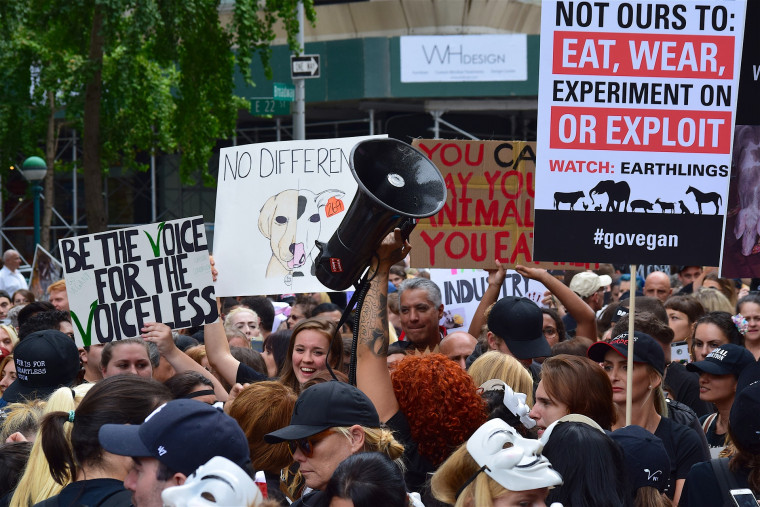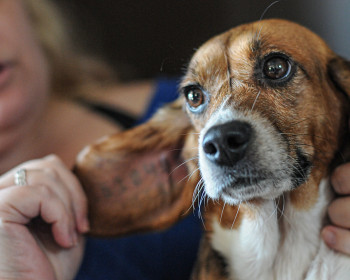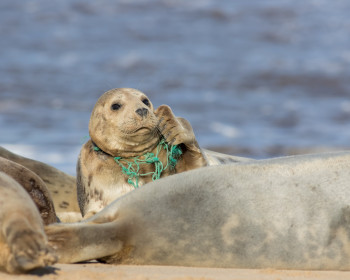Capturing the History of the Animal Rights Movement: An Interview with Kim Stallwood
Open gallery

With the tremendous growth in animal law, protection, and education, it can be easy to forget that this movement is still relatively new. Recently, Professor of Practice Joyce Tischler, animal law pioneer and beloved Mother of Animal Law, sat down with Kim Stallwood, animal rights activist, author and independent scholar from Britain, to celebrate the exciting news that the Kim Stallwood Archive of research documenting the history of the animal rights movement is becoming part of the British Library’s permanent holdings this fall. The British Library is the national library of the United Kingdom and provides information services to academic, business, research, and scientific communities. Kim’s unique collection chronicles the animal rights movement’s development from the mid-1970s through to the late 1990s. Joyce was eager to celebrate this news and learn more, as she previously captured the history of animal law in the United States in a two part series for the Stanford Journal of Animal Law & Policy called The History of Animal Law, Part I (1972-1987) and A Brief History of Animal Law, Part II (1985-2011). Enjoy this conversation between Joyce and Kim!
Joyce: Kim, I’ve always considered you to be not only one of the most important voices shaping the animal rights movement, but also one of its most thoughtful and insightful commentators. I was thrilled to see the announcement that your materials, which offer a first-hand account of what our movement was like at the start, and how it has grown, will be available to the public through the British Library. While you and I have been friends for many years, for those who may not know you as I do, can you share your background and how you became involved in the animal rights movement?
Kim: Well, thank you Joyce. For those who don’t know me, I began my activism after a job in a chicken slaughterhouse prompted me to become a vegetarian in 1974 and a vegan two years later. I then went on to become a prominent activist working with such groups as Compassion In World Farming, the Royal Society for the Prevention of Cruelty to Animals and the British Union for the Abolition of Vivisection (now Cruelty Free International). I moved to the United States in 1987 to become the first executive director of People for the Ethical Treatment of Animals. I was the editor-in-chief of The Animals’ Agenda magazine before co-founding the Animals and Society Institute in 2005. I then returned to England in 2007, where I continued my work as an author and independent scholar. My book, Growl: Life Lessons, Hard Truths, and Bold Strategies from an Animal Advocate, was published by Lantern Publishing & Media in 2014. I was honored that Brian May, musician and astrophysicist, wrote the foreword. I’m a member of the board of directors of the Culture & Animals Foundation, the U.S. based not-for-profit organization founded by philosopher Tom Regan and his wife, Nancy, in 1985 to support artists and scholars in advancing our understanding of and commitment to animals.
Joyce: Let’s talk about the archive, why did you think it was important to archive these materials and what were you trying to accomplish?
Kim: As I mentioned briefly above, in the 1970s, I became a vegetarian, then a vegan, and started to work for animal rights (AR) organizations. As is my nature, I collected campaign materials, badges, newsletters, and magazines, and that’s how my AR archive began. As I became more involved as a grassroots organizer, I used the materials in my work. It’s important to gather materials about our collective work, because this is our history and if we don’t have control over our own history, others will, and they will get it wrong. My “mission” is to preserve the AR movement’s early history and help contribute toward building an intellectual base and understanding our relationship with animals. For many years, I believed the AR movement started when I first got involved. Then, I discovered that there were generations of activists, writers, artists, and others whose work preceded mine, people like Henry Salt, Anna Sewell, Henry Bergh, Mary Midgley, and Brigid Brophy. The work we do today is based upon the pioneering work of these people. The more we understand the full history of the struggle for social justice for animals, the more equipped we will be in the future to be a success.
Joyce: How large is the archive?
Kim: For those not familiar with the British Library, it is equivalent to the American Library of Congress, where files and materials are protected in perpetuity for the citizens, for the people. The significance of the British Library accepting my archive is that it indicates the British Library’s recognition of the importance of collecting material about animal rights and the AR movement.
My research material that the British Library now has includes nearly 600 organization files, 150 people files, and 118 subject files, correspondence, 18 years’ worth of appointment diaries, six address books, and some material that I designated as confidential, which will be embargoed for 25 years. The Library also took two old laptops to download my work that they recognized as “born digital” files. They accepted a total of 36 boxes of materials. They did not accept my library of 2,000+ books, because they already have those books. I will continue to look for an appropriate repository for those books,100 boxes of materials, photos, and such priceless items as the original footage of 1990 March on Washington and a collection of 19th and 20th rare leaflets.
Joyce: Can you tell us about a few of the highlights?
Kim: In 1979, I co-founded Coordinating Animal Welfare (CAW), and we helped to pioneer grass roots activism. The archive includes correspondence dating back to the 1970s and 1980s with authors, such as Jim Mason, who wrote Animal Factories, as well as other correspondence with philosophers and advocates discussing the modern animal rights movement. Back then, CAW held bi-monthly meetings in London, which drew 200 activists. At these meetings, we would plan protests, develop tactics, discuss current animal-related events, and listen to speakers, such as Peter Singer. We also published a bulletin from 1979 to 1982. These materials show the role of this organization in fostering early activism, bringing activists together and helping them to organize.
Joyce: In the announcement about the archive, you said that “The history of the animal rights movement parallels the struggle of other social and political movements to give voice and recognition to those who have long suffered without either. I have devoted my life to this mission.” It’s such a beautiful sentiment and I couldn’t agree more. What parallels do you see between the animal rights movement and other social and political movements?
Kim: I have always understood AR as part of a progressive agenda for social change, and have seen the struggle for AR as paralleling feminism, GLBTQIA rights, feeding the world, healing people. I’ve never seen it as a separate, stand-alone issue; I’ve always understood it as integral to progressive social change.
Joyce: How do you envision the archive being used?
Kim: It will be catalogued and made available to be used by scholars, researchers, journalists, activists, and the public, so they can understand the history of the AR movement and learn from our tactics, strategies, and mistakes. It will also help people understand the evolution of the thinking of animal ethics. This research will show parallels between AR and other social justice struggles. It tells the story of AR.
Joyce: As you look to the future of this movement that you’ve been a part of for more than forty years, what do you envision for the future? And, how do we get there?
Kim: The challenge of the AR movement is to achieve moral and legal rights for animals and change how we treat animals. It must enter the mainstream and sit alongside the environmental movement, how we treat people, how we feed children. It’s got to become a dominant political issue, so that political parties pay serious attention to the issue. I think of Cory Booker, the U.S. Senator from New Jersey; he shares our values. We need 100 legislators who support our values in the Senate, and you get that by making AR a mainstream political issue. You get that when everyone in their own communities, whether at the state level, county level, and even school boards, works to elect legislators who support improving laws to protect animals.
Joyce: Thank you so much, Kim, for sitting down to discuss the archive, for your work preserving the history of the animal rights movement, and for making the world a better place for animals. Congratulations to you, from all of us at the Center for Animal Law Studies!

Joyce Tischler is Professor of Practice in Animal Law at the Center for Animal Law Studies at Lewis & Clark Law School, where she teaches Animal Law Fundamentals and Industrial Animal Agriculture Law. She is a trailblazer who pioneered the field of animal law. She is currently co-authoring the first casebook on industrial animal agriculture law.

The Center for Animal Law Studies (CALS) was founded in 2008 with a mission to educate the next generation of animal law attorneys and advance animal protection through the law. With vision and bold risk-taking, CALS has since developed into a world-renowned animal law epicenter, with the most comprehensive animal law curriculum offered anywhere. In addition, CALS is the only program that offers an advanced legal degree in animal law and three specialty Animal Law Clinics. CALS is a completely self-funded nonprofit organization operating under the Lewis & Clark College 501(c)(3) tax exemption, and is only able to provide these educational opportunities through donations and grants.
More Center for Animal Law Studies Stories
Center for Animal Law Studies is located in Wood Hall on the Law Campus.
MSC: 51
email cals@lclark.edu
voice 503-768-6960
Center for Animal Law Studies
Lewis & Clark Law School
10101 S. Terwilliger Boulevard MSC 51
Portland OR 97219

